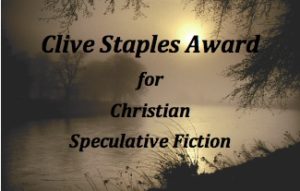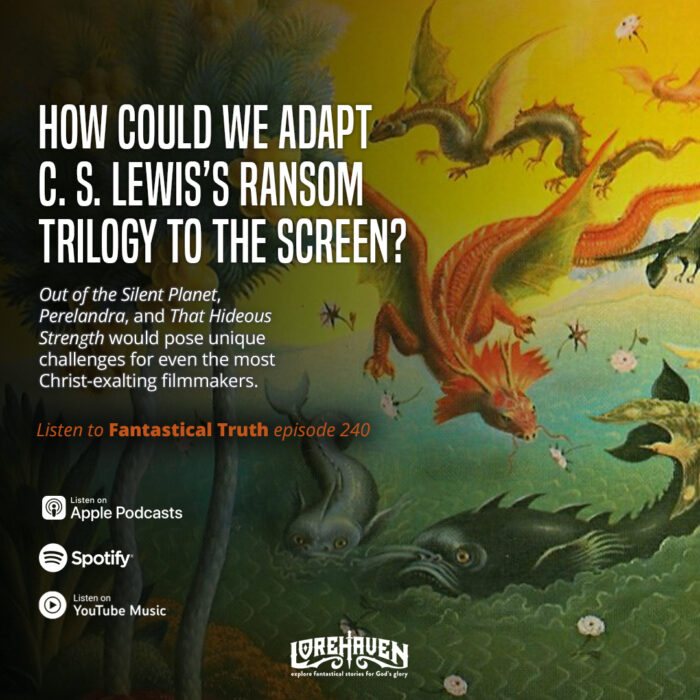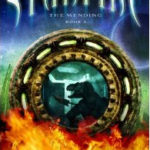Art And The Clive Staples Award
 At the end of May, the Gospel Coalition posted an article entitled “How to Discourage Artists in Church.” While there was much in the article that I didn’t agree with (not the least being that the author left off writers from the list of artists!), one thing that came out in the discussion was that Christians need to learn how to evaluate art.
At the end of May, the Gospel Coalition posted an article entitled “How to Discourage Artists in Church.” While there was much in the article that I didn’t agree with (not the least being that the author left off writers from the list of artists!), one thing that came out in the discussion was that Christians need to learn how to evaluate art.
A number of writers have said something similar, in particular pointing to a lack of informed reviews that help readers evaluate beyond determining whether or not they liked a book.
I happen to think liking a book is important, but there is more to evaluating a story. I liked Avatar, for example, but I also thought the story was derivative and preachy and the theme was anti-Christian. I was happy it did not win the Best Picture Oscar. But I really did like it. It was entertaining, kept my interest the whole way, and had stunning special effects. Stunning!
 As it happens, we are drawing close to the time when readers will be voting for the 2013 Clive Staples Award for Christian Speculative Fiction. We have thirty-three nominees. How are we to choose one Best Book?
As it happens, we are drawing close to the time when readers will be voting for the 2013 Clive Staples Award for Christian Speculative Fiction. We have thirty-three nominees. How are we to choose one Best Book?
Already some of our commenters have said they are going to have a hard time voting because there are so many good books to choose from. I also think there are good books on the list, and I don’t think it’s going to be easy to pick the one I want to vote for as best of the lot. But I’d like to think through the process of making that choice.
First, no reader should pick a book as best if they haven’t read it. This seems obvious, but the problem is, there are a number of online contests that are nothing but popularity contests. I’m thinking of the Predators and Editors contests (which they may or may not still hold). In the past, on any number of email loops an author would say that their book was nominated for best cover or best fantasy or best inspirational or whatever else, and please go to the link and vote for their book.
Of course, not having read the book or any of the competing books makes it impossible to actually say, yes, book X is better than all these others. But we can say, I like the author who asked me to vote, so I’m going to vote as requested.
The author, then, who has the most friends willing to respond, is the one declared the winner.
This is not consistent with the goals of the Clive Staples Award.
Instead of identifying a popular author, we want to honor fiction well written. The method we are currently using to determine this is Readers’ Choice–readers who read the book declare with their vote, this book is better than the others they read.
But what does “better” look like?
There are Standards posted as part of the contest rules, worded in a sort of “judge’s sheet” format. Any reader who wants to play judge is welcome to print out the standards and rate the books they are considering in each of the categories, then vote accordingly.
I know that’s a lot of work though, so maybe we can simplify the process for the rest of us. There are five sections in the CSA standards–writing, setting, characters, plot, and theme.
Writing. Good writing is not boring. It doesn’t go on and on, isn’t too flowery, filled with repetition, or too hard to understand. It might be lyrical, poetic, even beautiful in painting a picture, but it doesn’t do so at the expense of the story. In other words, the writing in fiction should serve the story rather than the story serving as a frame for the writing.
Setting. Speculative fiction often refers to this element as worldbuilding. Good worldbuilding comes down to this: do you, the reader, believe it and is it consistent? If you ever find yourself reading along and think, Really? the world is probably not as believable as it should be.
At the same time, if you’re reading along and say, Wait a minute! What happened to the . . . or, Weren’t there two of them in the last chapter? then the setting, the worldbuilding is not as consistent as it should be.
To avoid going on and on (because even nonfiction can do so, which makes it boring as well), I’m going to save a closer look at characters, plot, and theme for next time.
Meanwhile, share your thoughts about evaluating books. Is one of these elements, characters or plot, for instance, more important to you than the others? Is it OK to vote for a book that might be weaker in one element but is strongest in the element you believe to be most important?












































For me, one of the most important elements of a story is the characters. Even if there are some plot holes or setting combinations, I can fall in love with a story if I love the story. Conversely, if I don’t like the main character(s), I’m likely to put it down.
For example, almost everything was the same with the two half seasons of Doctor Who–except he got a new companion for the second half. And I don’t like her, so season seven (b) is really low on my list of episodes.
That’s a good example, Galadriel. I think character is really important too, so I guess we’re saying a book wouldn’t be award winning if it had a weak character arc or an unlikeable character?
But what if the characters become likable? I’m reading a book right now that’s hard for me to get into because the characters all seem so hesitant to do anything. They’re all feet draggers, not people I really want to cheer for. I want them to snap out of it and do the right thing.
So, what if they do? What if the change and I start liking them? Does a character who made it hard to like her at the beginning drag a book down?
Becky
Last year – flush with enjoying Stephen Lawhead’s Bright Empires series, and always kinda liking Robin Hood – I decided to read Hood, the first book of Lawhead’s Robin Hood trilogy.
And boy, was it a let-down. Bran (Robin) was – to put it briefly – a jerk. I didn’t like him, and there were times in the book when I didn’t even care if he lost.
This weakness reinforced the novel’s other weaknesses. Hood is slow-paced, and Lawhead takes many pages to enter the Robin Hood legend. That is not necessarily a flaw; I can have patience with authors who linger, and I don’t really mind taking 300 pages to get to Sherwood. But I didn’t have much patience with Bran, and I do mind taking a 300-page journey to Sherwood with a jerk for company.
I was furthermore disappointed to find Hood a cheerless rendition of what I had always thought a merry tale. Lawhead’s transformation of Robin Hood from a likable scoundrel to an unlikable one just aggravated the loss of merriness.
It’s not that Lawhead set up a jerk as the protagonist and didn’t even notice. That, when it happens, is an unforgivable error. He knew Bran’s shortcomings, and wrote a character arc to bring him out of them – a hero’s journey. I saw it. But it did not make me enjoy long, slow sections revolving around a character I didn’t like.
When you judge a novel, you have to take it altogether. Whether a weakness is fatal has a lot to do with how it coincides with other weaknesses – and strengths.
In fairness to Lawhead, I want to add this note: Hood had its merits, and if the book did not in itself pay off the investment of reading it, the rest of the trilogy did. Yes, I finished it.
Nice post. Writing and setting can really serve to grab the reader. My two favorite sff novels are very strong on both, but for different reasons. In the first, the prose pops out as intellectual, but that serves the setting, which is mile a minute weird. And in the second the prose is almost comically simple, because the setting is inhabited by immature and insecure people. In both cases, the writing is stylistic, but the style keeps you locked into the setting.
Looking forward to your take on the other elements, but as characters was mentioned, I’ll give my take. I love it when characters undergo transformation, either good or bad, during the course of a novel. I’m a big pro wrestling fan, and it’s always fun when a ‘babyface’ or ‘heel’ undergoes a transformation (known in the wrestling world as a ‘face turn’ or ‘heel turn’). It’s always hamfisted, but that makes it easier to dissect. When I begin with an expectation for a character and it’s turned on it’s head, I respect the effort a lot more.
I think you’ve got it right. For me, the question is more of how the elements work together, and did the book and did it deliver on its promises?
There have been books that haven’t been technically perfect; maybe the writing wasn’t as smooth as it could have been or there were a few inconsistencies, but the author promised a rollicking adventure and that’s exactly what the book delivered! Other books try to be a thought-provoking story or a social commentary, and while they may not be my summer fun reads, they “work as advertised.” (I’m specifically thinking of Nancy Kress’s “Beggars in Spain” with this one.)
I think when the writer makes a promise to the reader and then follows through on the promise, that deserves to be recognized. Otherwise, we just boil books down to whether we like them or not. As readers that’s fine, but as judges, I think the authors probably deserve more.
[…] Last week, I began a look at the Clive Staples Award voting standards in order to help readers make the tough selection. In summary, this award of Christian speculative fiction is not a popularity contest. Consequently, no voter should choose a book he has not read! Our aim instead is to honor fiction well written. […]
Disappointing news. Looks like there’s lots of work to be done.
One book that I know is coming out some time very soon which I am looking forward to is Alpha Revelation by P A Baines (http://www.pabaines.com/). This is the sequel to his previous book Alpha Redemption. and will be released through Splashdown Books.
I apologise for the above mis-placed comment. I intended to post it on a different thread (the one about not many spec titles coming out this year) but I confused myself having too many tabs open. Please disregard.